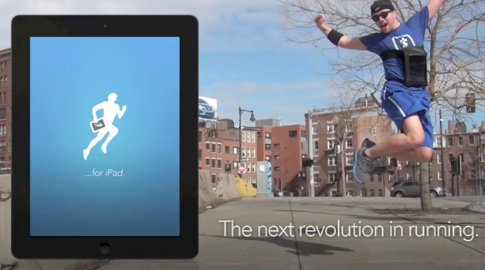 Early Monday morning, RunKeeper, maker of the popular fitness tracker app of the same name, tweeted, "We're revealing a real treat today: RunKeeper for iPad! Check it out!" and included links to both a blog post and a dedicated page on the company website.
Early Monday morning, RunKeeper, maker of the popular fitness tracker app of the same name, tweeted, "We're revealing a real treat today: RunKeeper for iPad! Check it out!" and included links to both a blog post and a dedicated page on the company website.
"We're always trying to do more to make running and getting in shape easier and more intuitive," the post says. "In the process, we've discovered that for many of our users, the phone screen is just too small to get all that important real-time fitness information into one convenient place."
The landing page is more direct. "RunKeeper for iPad: BIGGER is better," reads the message there, which is accompanied by a video of a runner sporting an iPad strapped to his chest. The iPad screen even converts to a "digital running bib" with race numbers, a weight scale when stood on and a calorie-counting food tray for "building a perfectly nutritious meal on the go."
Viewers can click on "get the app" to see a special message from RunKeeper: they have been had. It's April Fool's Day.
RunKeeper was not the only company having a little fun with digital health and health IT on this first day of April.
Epic Systems, the EHR vendor which never issues press releases, won't negotiate on price and even decides which healthcare providers are worthy of being its customers, does loosen up at least once a year, changing its home page each April 1.
This year, Epic pokes fun at all of its perceived inflexibility, including the fact that the Verona, Wis.-based company wants to sell end-to-end systems across entire enterprises, not break up its technology into pieces and interface with core technology from other vendors. "Long Rumored Epic Kool-Aid Recipe Finally Released; Closely-guarded recipe the subject of ONC inquiry," reads the lead headline.
"Now that the Epic Kool-Aid recipe is public, other healthcare software vendors report that they're working on their own variations of the drink, predicting that their flavors will be 'tastier, lower in calories, and more interoperable,'" the story says. "Epic is not releasing its 'secret sauce' recipe, since it is mostly just mushroom soup."
Later, Epic takes a dig at national health IT coordinator Dr. Farzad Mostashari's wardrobe with a story headlined, "MU3 requires Eligible Providers to wear bowties." (For the record, Farzad's Bowtie has had its own Twitter account since February.)
Speaking of things dating back to February, the National Committee for Quality Assurance (NCQA) got the April Fool's part right but perhaps still got slightly confused on the month, since it tweeted a tired Internet meme in the form of a "brief video explaining our upcoming initiatives." It was NCQA staff doing the "Harlem Shake."
Outside the immediate realm of healthcare but still fairly relevant was British banking giant Barclays, which, in a new video, features a new smart card with embedded near-field communications (NFC) technology. For dogs. Barclaycard PayWag – and the bank missed the perfect opportunity for a "Barklaycard" pun – might even have a future in healthcare, since veterinary medicine seems to be farther along the journey to interoperable EHRs than human medicine is.
Internet heavyweights also got into the action, some even with a bit of a healthcare bent. Twitter, which already caters to the ADHD crowd with 140-character messages, announced plans to go even more concise with "Twttr," which cuts the alphabet down to 21 letters, too, by allowing only consonants. ("Y" remains free.) If you want vowels, pay $5 a month for full-fledged Twitter.
Google unleashed – see, dog puns are easy – several April Fool's pranks, too, including Google Nose, a scent engine (in beta) that searches the massive Google Aromabase.
That's not to say Google is always ahead of the curve, though. The company also introduced Gmail Blue in time for April 1. Well, guess what, Google? You're a little late to the party. Healthcare has had its Blue Button for nearly three years now.

















